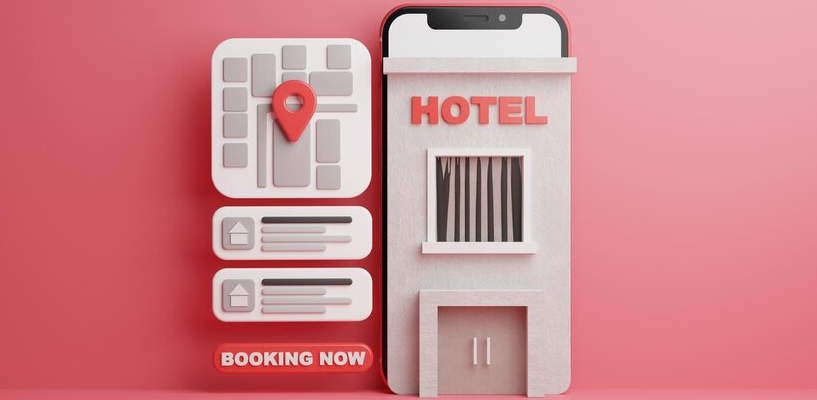Hotel Booking App Development

Online sales in the hotel segment will produce 82% of the total revenue by 2028.
The hotel market is always the most dynamic and adaptable due to the constant stream of new technologies, customers, and global trends. The increasing popularity of hotel booking apps in the last few years has transformed the relationships between guests and hotels, steering in an era of productivity, ease, and customization. It is essential to peep into emerging tendencies in hotel booking apps and their possible effects on the industry.
The advent of mobile devices revolutionizes how people manage their hotel reservations. The days of calling hotels or waiting for emails to book a stay are long gone. Nowadays, customers can do all that by sitting on a couch.
The cutting-edge hotel booking software has allowed the hotel industry to engage more customers and provide their services online without investing in traditional modes of advertising. Also, it has provided hotels with exceptional potential to enhance guest experiences and improve operations.
This blog post unveils unprecedented hotel booking software trends, features of the hotel booking apps, the development process of the app, and future innovation.
Exploring Hotel Booking Software Trends
Below are some general tech trends in hotel booking software that have transformed the industry as a tech-driven invention.
Artificial Intelligence (AI) & Machine Learning:
The hotel industry is becoming accustomed to using AI and machine learning to improve data quality and reduce the likelihood of human errors.
These technologies enable hotels to offer clients customized suggestions on desired services, room types, and special offers. Virtual assistants and AI-powered chatbots may respond immediately to people’s queries, boosting customer services while emphasizing more intricate work.
AI-driven pricing algorithms optimize room rates in retort to occupancy rates, demand, and rival pricing, enhancing hotel revenue. Hotels can take the help of these predictive analytics to create data-driven decisions about their rates and inventory.
Mobile Applications and Contactless Solutions:
During and after the COVID-19 pandemic, the hotel industry has pushed towards adopting contactless payment methods. Mobile applications of hotel booking systems have become crucial resources for customers to utilize to check in, access their rooms, order room service, and check out without having to physically communicate with a hotel staff member at any point in the process.
This pattern continues as long as guests value security and convenience highly. Mobile apps allow hotels to deliver personalized notifications about special offers and get customer feedback. It helps hotels strengthen their ties with guests and maximize loyalty by investing in a user-friendly app.
Blockchain Technology:
Did you know the hospitality industry is blockchain technology’s most prominent early adopter? It is because the industry promises to enhance transparency and safety. Blockchain technology helps produce an unchangeable and secure database of customers’ reservations, preferences, and payments. It ensures the data is safe to audit easily and non-permissible to alterations.
Executing smart contracts on the blockchain can simplify hotel payment processes and diminish the likelihood of disagreements between hotels and guests. This technology transforms the method of making reservations and payment management. It makes the booking procedure more effective and reliable.
Voice and Chatbot Interfaces:
Integrating AI and natural language processing allows hotels to offer customers more tailored experiences. Hotel guests can easily make requests, manage in-room services, and gain access to information using voice-controlled assistants, such as Google Assistant and Amazon’s Alexa.
Chatbots embedded into hotel websites enhance guest engagement and happiness by permitting immediate reservations, communications, and inquiries. These innovations enhance the visitor experience by facilitating business functions and developing them to be more user-friendly, raising standards for hotel and hospitality services.
Mobile Booking and Check-In:
The increasing number of smartphones has benefitted travelers with a new level of control over hotel booking and search processes. Due to its user-friendly design, they can instantly browse options, attain up-to-the-minute facts, and ensure bookings with the help of hospitality and travel software.
Mobile check-in procedures enhance the visitor experience by permitting guests to refrain from using check-in desks, curtailing check-in lines, and providing digital room keys. These developments demonstrate the industry’s dedication to acclimating to changing traveler choices. It helps them boost the client experience and overlap with the individualized and contactless service requirement.
Robots in Hotels and Restaurants:
The intriguing technology trend in the hospitality sector is using robots to carry out tasks that people previously managed manually. For example, robots could fill the hotel concierge position, welcoming customers and exhibiting them with relevant customer information.
Some hotels have begun employing robots for cleaning tasks, such as vacuuming floors and disinfecting surfaces.
Data Analytics and Personalization:
Hotels have become increasingly proficient at influencing the power of guest data to personalize experiences to the tastes of individual guests. Advanced analytics lets them gather insights into booking patterns, visitor behavior, and preferences. This enables them to provide customized services such as eating alternatives, room amenities, and suggestions about nearby restaurants.
This level of customization increases client happiness and encourages customer loyalty and retention.
Voice Search and Virtual Assistants:
Some hotels have adapted their booking systems to meet the increasing popularity of voice-activated searches. There are many mobile app ideas to increase the travel and tourism experience that may improve with a voice recognition feature. Voice search allows businesses to offer search features with voice options and help people make reservations and access hotel information.
The voice-activated option provides customers with an enhanced level of convenience, sweetening guests’ experience. It makes way to generate new revenue streams via voice-enabled promotions and services.
How to Develop a Hotel Booking App
Before developing the hotel booking app, it is essential to consider a few aspects to decide what app type and exactly you need in it. You won’t skip any important aspect of the entire plan if you adhere to the development steps mentioned below:
Perform Competitor Analysis:
Before developing an app, understand how your competitors in the market operate and what their offerings are. The more data you have, the better you can decide about your app features and roadmap.
To conduct an in-depth competitor analysis, read other players’ blogs, service pages, and media articles.
Evaluate your Competitive Features:
The best features of the hotel booking app ensure the image of credibility for the business. Below is an overview of features that make your app more popular among your targeted group.
Search Options
Hotels can provide exact information about amenities and services. The app’s primary functions revolve around the search feature and its abilities. The design of a search option must be easy, swift, straightforward, and user-friendly. Searching is the primary reason people use mobile apps for travel.
Hotel Information
Hotels can offer a closer view to travelers before they make a reservation. The app must include images, descriptions, reviews, and more of rooms. It must exhibit hotels, hallways, suites, and other areas in immersive films and dynamic visualizations using 360-degree photos.
Filters
Customers can filter the results according to their preferences, developing your reputation and customer engagement. It gives you the possibility to exhibit all deals as per their searches. For instance, offering discount deals on the type of rooms they search for and customers’ reviews helps them get the most reasonable room possible.
Chatbot
Having a chatbot in the app helps you communicate with customers 24/7. Bots can help them resolve their queries during your business non-working hours. Also, chatbots save customers’ messages that you can read and know of during your working hours.
Push Notifications
A hotel booking app must be responsive to customers’ requests and queries and include a real-time alert system for customers. Alongside confirmation of notifications and reservations, it could inform users about the latest promotional offers, upcoming bookings with check-in and check-out details, rate changes, and more.
Reliable in-app payments
Applications include contemporary features nowadays. Make sure to link your app with a reliable payment mode. Paying in real-time is viable, as is securing private user cards such as debit and credit information. The information (saved cards) is available whenever visitors pay once entered and stored within the app.
Payment Receipts
The client needs confirmation of the room reservation after they have made it. Customers can track their booking information by getting an automatically generated mobile or email phone receipt.
Cancellation Policy
Cancellation charges cover customers during bookings. The app has the option that allows travelers to cancel their stay in case of emergency. Every hotel has flexible cancellation policies and guidelines covering refund terms.
Language Recognition
The app contains an automated system for recognizing languages when you have a global customer base. It permits you to provide your customers with a personalized experience. For instance, the default language of most hotel booking apps is English. If the user is from Spain, the app’s language must be visible to them in Spanish.
Understand the Basic Types of Hotel Booking Apps:
A clear concept of hotel booking apps helps you know what you must include in your services and offerings. Below are the most basic types of hotel booking apps-
Hotel Consolidator Apps
These apps emphasize particular hotel chains, allowing you to book hotels within the chain.
Last-minute Booking Apps
These apps are helpful for those who need a hotel at the last minute or prefer to opt for last-minute trips and require instant hotel bookings.
Advance Booking Apps
Such apps have great features to make customers book their stay in advance, even a year ago.
Hybrid Booking App
This app features advanced and last-minute options, offering flexibility to customers.
Accumulate Requirements and Design Wireframes:
Once you have decided on the features and app type, collect information about your app’s layout and design. The professional developers can help you accomplish your goals. You must stay involved throughout the entire process.
Search for the best development team who can meet all your requirements hassle-free. Let Hyperlocal Cloud be your development assistant, building and launching your app at your convenience. Contact us now!
Develop an MVP:
Ensure your idea has a clear monetization strategy before developing a hotel booking app. Consider a recurring revenue strategy if you plan to charge for your app.
An MVP is a fundamental feature that permits it to possess value from the first day it’s released to the market. Moreover, the app acts as a catalyst to make money.
Launch and Evaluate the Outcomes:
The development process takes time, but not to the extent. Once created, the app is ready to launch. Developers perform quality assurance before launching and ensure the app is ready.
The experts at Hyperlocal Cloud help you launch your app in the market and monitor its performance.
Upgrade and Add New Features:
Once assured your app is performing well, it’s time to work on additional features that provide you an edge over your competitors. Utilize the option of adding reviews and travel guides on your app. Ask your customers to give feedback. This movement is helpful to increase conversion rates and user engagement by helping customers in the decision-making process.
How Does a Hotel Booking App Make Money?
Hotel booking apps are lucrative in many ways. They make money through the following:
Service Fee:
Charges are applied for every hotel booking. For example, Airbnb charges commissions from the users.
Subscription:
The apps have subscription options for users to avail of more exciting deals and discounts. It is applicable for premium features as well.
Advertising:
You can promote travel-related offerings on the app, provided you get paid for endorsing their brands.
Platform Listing:
You can charge hotels that want to list on your platform, which can be a one-time or monthly payment.
Convert Your Hotel App Idea into Reality
Hotel Booking App Development Costs
The cost of developing a hotel booking app relies on many factors. They are
- App type
- Features required
- App’s complexity
- App platform- iOS or Android
- Development process- native or cross-platform
- Tech-stacks
- Number of developers needed
- Deployment cost
Determining the estimated cost of developing a hotel booking app takes work. But the price can range between $10K and $14K. Also, it depends upon the time required to develop the app.
The Bottom Line
Due to the usage of applications in large numbers, hotel businesses have umpteen possibilities to communicate with and serve customers at every point of their journey. You can grow your business and attract new clients by integrating hotel booking applications into your hotel working system.
If you have been browsing the web and searching for the best app development company, your hunt ends at Hyperlocal Cloud. Our development wizards aim to deliver top-notch applications that enable seamless user experiences on devices and platforms.





